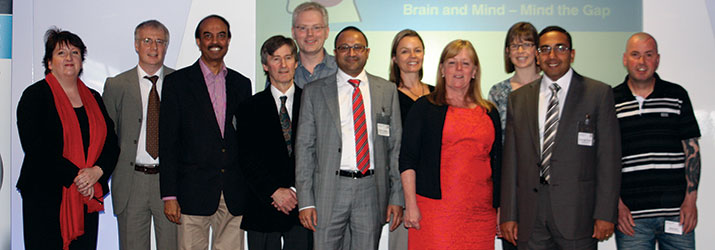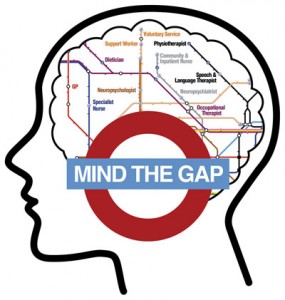
Take home messages:
- ABI is a family affair.
- The introduction of national specialised commissioning, dedicated clinical reference groups and a specialist rehabilitation tariff, has placed ABI services in the spotlight.
- Post ABI neuropsychiatric conditions are often under recognised.
- Organic Personality Disorder is a severe complication of ABI.
- There is limited evidence on management of aggression in ABI.
- Childhood onset neuropsychiatric conditions can be related to early life ABI.
- Mild traumatic brain injury continues to be a source of debate.
- Litigation can facilitate rehabilitation.

Over recent years, there has been considerable recognition of Acquired Brain Injury (ABI) and its significant impact on patients, families and society as a whole. While commissioners of services will have ABI on their agenda, there is still a considerable heterogeneity as to which patients will have access to which service.
The first National ABI Conference was aimed at “bridging the gap” in relation to service developments, clinical management and the interface between ABI and the law. Most importantly, however, it aspired to enhance the notion of always aiming to provide holistic, patient-centred, individually tailored care that will maximise our patients’ quality of life and their integration within society.
The programme of the day flowed well with a great mix of keynote and seminar sessions. All presentations and videos from the day were made available for delegates after the event.
The day started with a welcome address from Ms Fiona Myers, Chief Executive of North Staffordshire Combined Healthcare NHS Trust. She highlighted the need for integrated working amongst various organisations. She also addressed the unique interaction of physical and mental health issues in patients with ABI that would obviously have a considerable impact on management and service planning.
Dr George El-Nimr, Consultant Neuropsychia-trist and Clinical Lead for Neuropsychiatry and Old Age Psychiatry Services gave an overview in relation to ABI clinical presentations and management. He emphasised the need to evaluate existing evidence and identify gaps in available research. Recent evidence was presented in relation to specific aspects of ABI services.
Following on from this overview, the impact of ABI on the family was covered by Ms Ava Easton, Chief Executive of the Encephalitis Society. Ms Easton emphasised the fact that ABI is actually a family affair. Relevant video footage and quotes were presented.
This was followed by an outstanding presentation from a local patient who talked about his own experience with ABI and how the reaction of society can make a huge difference to the patient’s well being. Similarly, our patient talked about the need for standardised services that should be available to all ABI sufferers.
A session chaired by Professor Saumitra Deb of Imperial College, London focused on ABI services. Two talks were delivered in addition to a question and answer session. The first talk was delivered by Dr Alex Ball, Consultant and Clinical Lead for Rehabilitation Medicine. Dr Ball is currently the West Midlands Director of Trauma Rehabilitation. In her talk, she presented various national drivers for change in such services. The introduction of a Specialist Rehabilitation Tariff from April 2013 was particularly highlighted.
The second talk was delivered by Dr Niruj Agrawal, Consultant Neuropsychiatrist at St George’s Hospital, London who gave a talk on Neuropsychiatric services for ABI patients. Dr Agrawal focused on Traumatic Brain Injuries (TBI). The importance of having Neuropsychiatric input both into the acute and chronic phases were emphasised.
After lunch, Dr Andrew Worthington, Consultant in Neuropsychology and Rehabilitation, gave a talk on the therapeutic value of cognitive testing. Dr Worthington discussed the uses and abuses of formal assessment.
Later in the programme, conference delegates were offered the chance to attend two of four parallel seminars addressing specific clinical and medico-legal issues.
Dr Rafey Faruqui, Chair of the Section of Neuropsychiatry at the Royal College of Psychiatrists, explored issues related to prognosis as well as complex physical and mental health comorbidities in the aftermath of early life brain injuries. The talk raised a number of public health related questions.
Another seminar delivered by Dr Mike Dilley, Consultant Neuropsychiatrist, presented the available evidence in relation to pharmacological interventions that would best manage aggression and agitation in ABI.
The issue of clinicians as expert witness was addressed by Richard Crabtree & Mark McGhee of Fentons Solicitors. The seminar presented some of the practicalities clinicians have to bear in mind when providing reports and testimony to courts and tribunals. This seminar covered issues around civil proceedings and the Court of Protection jurisdiction.
Philip Edwards & Hilary Wetherell of Irwin Mitchell Solicitors indicated in their session that, used effectively, litigation can support and facilitate rehabilitation. It was argued that utilising the lawyers as part of the multidisciplinary team can assist in achieving favourable outcomes.
The late afternoon session focused on ABI and the law in more general terms. A talk delivered by Dr Seb Potter, Consultant Clinical Neuropsychologist, addressed clinical and medico-legal dilemmas related to the diagnosis of mild TBI.
Dr Kieran O’Driscoll highlighted the overlapping features with Dissocial Personality Disorder. The presentation explored the anatomical basis and behavioural similarities for these disorders and the implications for the Criminal Justice System.
Feedback from the day was extremely positive and very encouraging for the planned second national ABI conference.
ACNR 2013;13:5:31